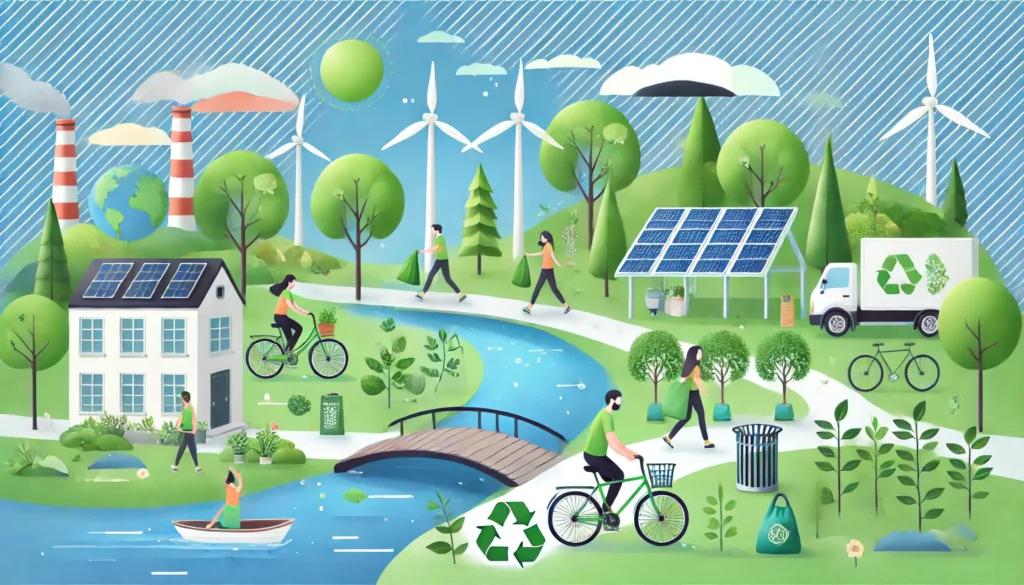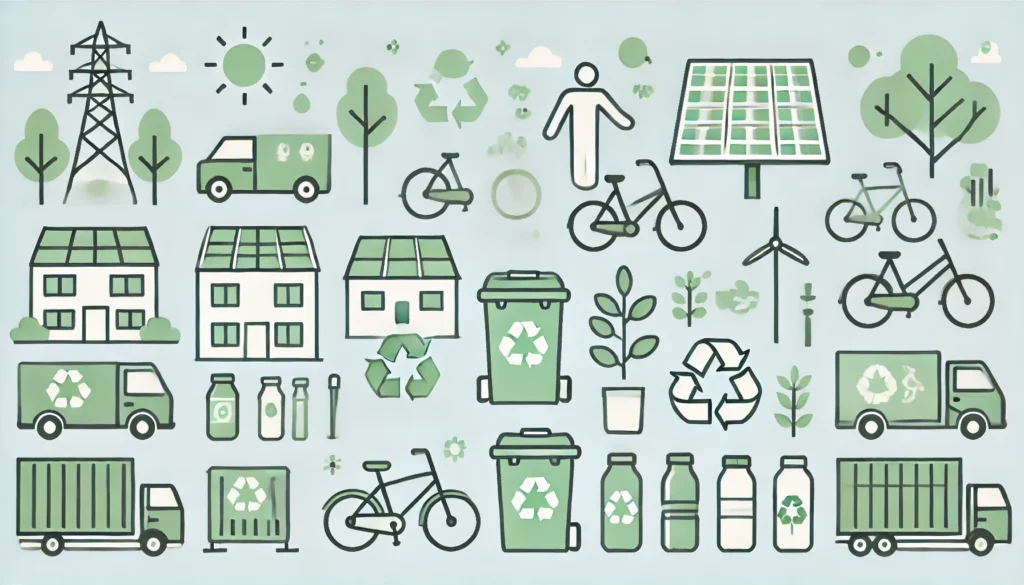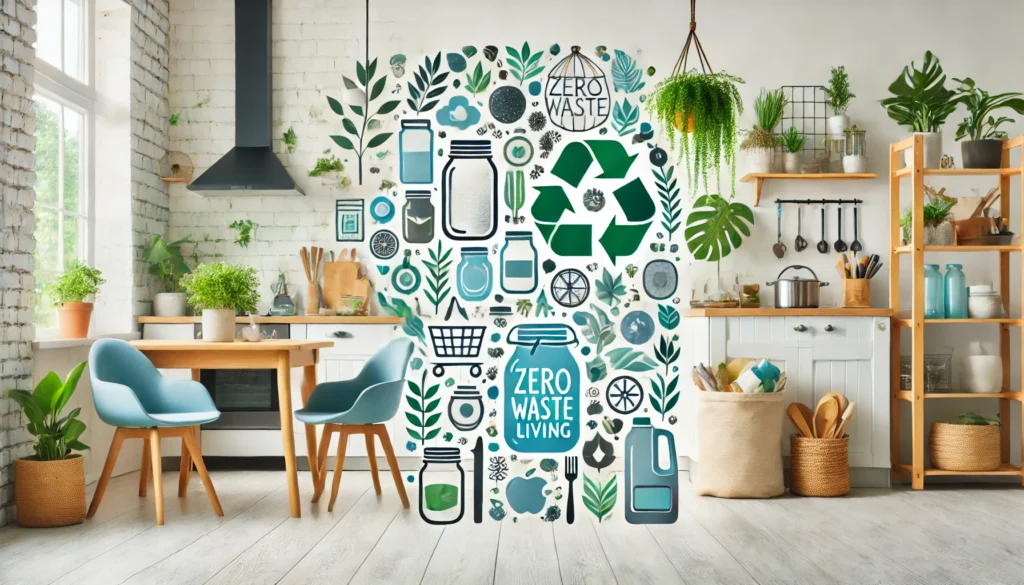In today’s world, protecting the environment has become more important than ever. Every action we take has a lasting effect on the planet. Fortunately, making eco-friendly choices doesn’t have to be complicated. By adopting a sustainable lifestyle, we can all contribute to a healthier environment. In this blog post, we’ll explore some practical, easy-to-follow ways to reduce our ecological footprint, with examples to make the concepts clear.
What Does a Sustainable Lifestyle Mean?
A sustainable lifestyle is about living in a way that minimizes harm to the environment. This means using fewer resources, reducing waste, and making conscious choices that positively impact the planet. Sustainability isn’t about big changes all at once; instead, it’s about small, daily habits that add up over time. Whether it’s through reducing energy consumption, conserving water, or choosing eco-friendly products, anyone can adopt a more sustainable lifestyle.
1. Reduce Energy Usage at Home
One of the simplest ways to protect the environment is by using less energy at home. Energy production, especially from non-renewable sources, releases a large amount of carbon dioxide into the atmosphere, contributing to global warming.
Examples:
- Switch to energy-efficient light bulbs (like LED bulbs) that use 75% less energy than traditional ones.
- Turn off appliances when not in use. For instance, unplugging your phone charger when it’s not charging can save a small but significant amount of energy.
- Opt for energy-efficient appliances, such as refrigerators or washing machines with Energy Star ratings, which consume less electricity.
Not only will these steps reduce your energy bills, but they will also decrease your carbon footprint.
2. Practice Water Conservation
Water is a precious resource, and conserving it should be a top priority. Many regions are facing water shortages, making it essential to use water wisely.
Examples:
- Fix leaky faucets to prevent wasting water. A dripping faucet can waste gallons of water each day.
- Install water-saving showerheads and toilets that use less water.
- Water plants early in the morning or late in the evening to reduce evaporation.
Simple habits like turning off the tap while brushing your teeth can save a lot of water over time. The key is to be mindful of how much water you’re using and make small adjustments where you can.
3. Minimize Single-Use Plastics
Plastic pollution is a massive environmental problem, especially in oceans and waterways. Reducing the use of single-use plastics, such as plastic bags, straws, and bottles, can greatly benefit the environment.
Examples:
- Carry a reusable water bottle instead of buying plastic ones.
- Use reusable shopping bags and avoid plastic packaging when possible.
- Invest in eco-friendly alternatives like metal straws or cloth bags.
These changes may seem small, but when multiplied by millions of people, they can make a huge difference in reducing plastic waste.
4. Choose Sustainable Transportation
Transportation is one of the largest contributors to greenhouse gas emissions. Choosing more sustainable methods of getting around can significantly reduce your carbon footprint.
Examples:
- Walk or bike for short trips instead of driving.
- Use public transportation or carpool to reduce the number of cars on the road.
- If possible, invest in an electric or hybrid vehicle that produces fewer emissions.
By opting for sustainable transport, you’ll not only protect the environment but also improve your physical health.
5. Adopt a Plant-Based Diet or Reduce Meat Consumption
The food industry, particularly meat production, is a significant source of environmental damage. Livestock farming requires enormous amounts of water, land, and energy, while also producing greenhouse gases like methane.
Examples:
- Reduce meat consumption by having one or two plant-based meals each week.
- Try to buy locally grown food to reduce the carbon footprint associated with transporting goods long distances.
- Support organic farming, which often uses fewer harmful chemicals and promotes soil health.
Even a small shift towards a more plant-based diet can lower your environmental impact significantly.
6. Reduce, Reuse, Recycle
The three Rs – reduce, reuse, and recycle – are fundamental principles of sustainability. By following these steps, we can decrease the amount of waste we generate.
Examples:
- Reduce your waste by buying products with minimal packaging and choosing durable goods.
- Reuse items whenever possible. For instance, glass jars can be repurposed for storage, and old clothes can be donated or upcycled.
- Recycle paper, plastic, and glass products instead of throwing them away. Check your local recycling guidelines to ensure you’re recycling properly.
When we focus on reducing waste, we conserve resources and protect the environment from further harm.
Small Steps Lead to Big Changes
Adopting a sustainable lifestyle doesn’t require drastic changes. By making small, conscious decisions in our daily lives, we can significantly reduce our impact on the planet. Whether it’s conserving water, reducing energy consumption, or cutting down on plastic waste, every action counts. Protecting the environment is a collective effort, and with everyone doing their part, we can make a difference.
Discover more from Green Ecosystem - Renewable Energy, Agriculture, and Environmental Sustainability
Subscribe to get the latest posts sent to your email.


